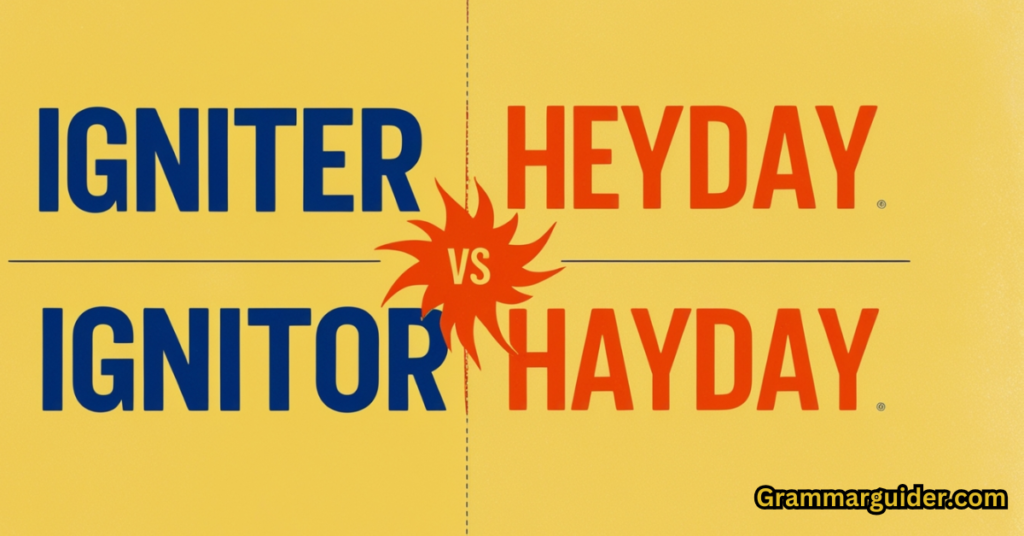It’s a common confusion that often leaves people scratching their heads: heyday or hayday. Which is the correct one to use? And what does each word really mean? These two terms, though similar in appearance, have very different meanings and usages. In this article, we’ll explore the Heyday vs Hayday debate, explain their meanings, provide Heyday examples, and help clear up the hayday confusion once and for all.
By the end, you’ll not only understand the correct spelling of heyday, but you’ll also be equipped with the knowledge of its synonyms, history, and proper usage.
What is the Correct Spelling of Heyday?
The word Heyday vs Hayday (spelled h-e-y-d-a-y) is the proper term that refers to a period of success, peak achievement, or glory. It signifies the prime time or golden age of something, whether it be an individual’s career, a specific industry, or even a cultural movement.
Hayday, on the other hand, is simply a misspelling of heyday. There is no word “hayday” in the dictionary that matches the meaning of heyday. Heyday vs Hayday may pop up in casual writing or typing errors, but it should be avoided in formal contexts.
Let’s break it down further by looking at the meaning of heyday, its origins, and heyday pronunciation.
What Does Heyday Mean?
The heyday meaning is often tied to the idea of the best or most successful time in a person’s life or a period in history. When we refer to something as being in its heyday, we’re talking about its peak period or a time when things were at their highest point.
For example, consider a famous rock band that was wildly successful during the 1970s. You might say, “The band’s heyday was in the late ‘70s when they sold millions of records.”
Here’s another scenario:
Heyday Example in an Email:
Subject: The Heyday of Our Project Team
Dear Sarah,
I wanted to take a moment to reflect on the heyday of our project team. Back in 2021, when we launched that major initiative, our collaboration reached new heights. The entire team was at its peak period, delivering results faster than anyone could have imagined. Those were the days of true success!
Best regards,
John
In this email, the writer refers to the heyday of the team’s performance, highlighting a period of success and accomplishment.
Origins of Heyday
The word heyday has an interesting history. It first appeared in the 17th century and was originally spelled “hayday” (though it wasn’t used in the sense we know it today). Its original meaning was tied to the idea of a celebratory call made while harvesting hay. Over time, it evolved into the modern meaning of a period of great success.
The history of heyday shows how words and phrases can change over time, taking on new meanings and nuances.

Heyday vs Hayday: Clearing Up the Confusion
The hayday confusion often arises because these words sound almost identical. However, heyday is the only correct term, referring to a time of flourishing or success, while hayday is simply a typographical error or misspelling.
Consider this example:
Incorrect: “The company is experiencing its hayday right now.”
Correct: “The company is experiencing its heyday right now.”
In this case, the correct spelling is heyday, which signifies that the company is currently in its golden age or most successful period.
Heyday Pronunciation
If you’re unsure about how to pronounce heyday, you’re not alone. The word is pronounced as /ˈheɪˌdeɪ/, which sounds like “hay-day.”
Let’s practice:
“I’ve been in my heyday as an entrepreneur, and it feels great!”
Heyday Synonyms
Now that you have a solid understanding of heyday usage, let’s explore some heyday synonyms. If you’re looking for alternatives to mix things up, here are a few options that can fit various contexts:
| Synonym | Context |
|---|---|
| Peak period | A period of time marked by excellence. |
| Golden age | The most flourishing period in history. |
| Prime time | A time when something is at its best. |
| Zenith | The highest point of achievement. |
| Apogee | The highest or most advanced stage. |
For instance, instead of saying, “His heyday as a leader was in the 1980s,” you could say, “His prime time as a leader was in the 1980s.”
Heyday vs Hey Day
One might also encounter confusion between heyday vs hey day. While it may seem like hey day is a viable option, it is incorrect. Hey day is simply two words used together, but it has no meaning related to the idea of a golden age or prime time.
Example of incorrect usage:
Incorrect: “During his hey day, he was known for his quick wit.”
The correct version is:
Correct: “During his heyday, he was known for his quick wit.”
Heyday Usage in Sentences
Let’s look at some heyday examples to understand how to use the word in different scenarios.
- In a Business Context:
- “During the heyday of the tech boom, the company saw record profits and unprecedented growth.”
- In a Historical Context:
- “The heyday of the Roman Empire lasted for several centuries, during which it dominated much of Europe and the Mediterranean.”
- In a Personal Context:
- “Her heyday as a fashion designer came in the early 2000s when her designs were seen on every red carpet.”
Common Mistakes and Misconceptions
Sometimes people mistakenly refer to a period of success as a “hay day.” This is wrong and typically arises from confusion between the two terms, likely due to their similar pronunciation. It’s important to always use heyday when referring to a time of peak success or flourishing achievement.
A Common Misconception:
- Incorrect: “That was the hay day of my career.”
- Correct: “That was the heyday of my career.”
The second example is accurate because it highlights a period of significant accomplishment or prominence in a career.
The Importance of Correct Usage
Using heyday correctly can elevate the quality of your writing. Whether you’re crafting an email, writing a historical piece, or simply describing a period of success in someone’s life, getting the spelling right is essential for clarity.
Remember, hayday is always a mistake, while heyday is the word that refers to the peak period of something’s success.
Final Thoughts
In conclusion, understanding the difference between heyday and hayday is crucial for precise communication. Heyday is the only correct term, and it refers to a time when something or someone is at their prime or golden age. Whether you’re talking about the heyday of a company, the heyday of a city, or even a person’s heyday, using the word properly can bring clarity and depth to your writing.

Harley Rose is a seasoned expert in English grammar and writing tips, blending years of knowledge and a love for language into her work. With a sharp eye for detail and a talent for making grammar accessible, Harley shares practical insights that help readers write with precision and flair. Her content is ideal for anyone looking to strengthen their writing skills and express themselves with confidence.

